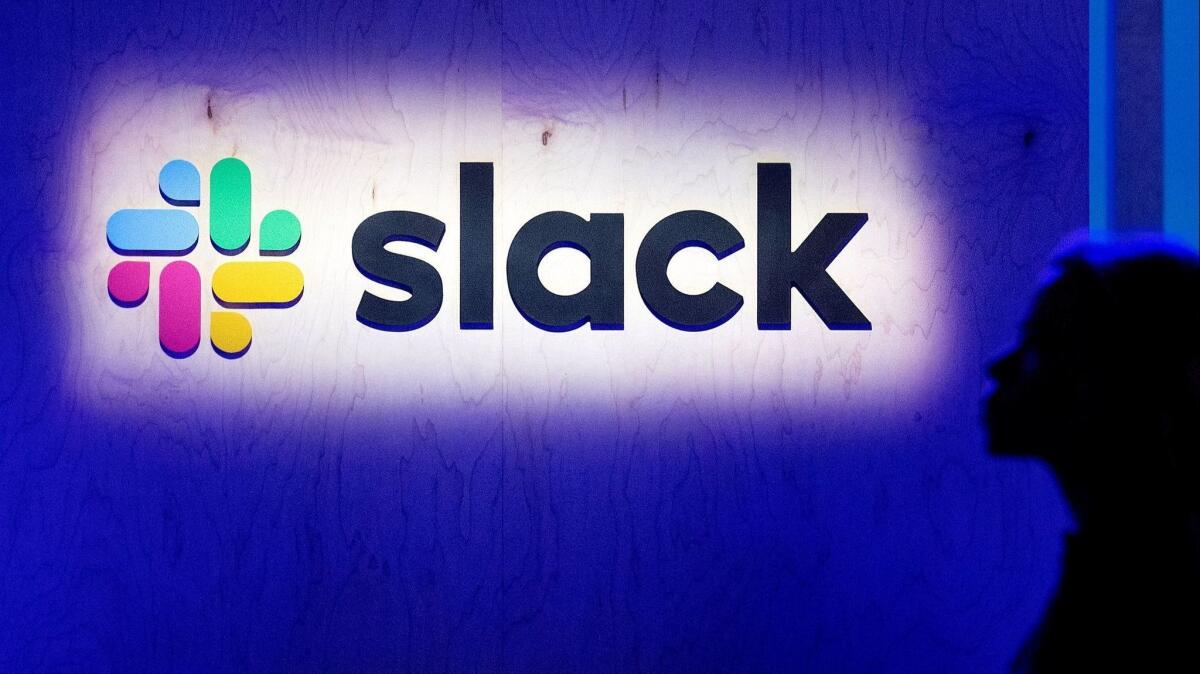Slack projects slower sales growth, and its stock slumps

Slack Technologies Inc. stock plunged in after-hours trading Wednesday after the company projected slower sales growth for the second half of the year, signaling that strong competition may dent the rapid rise of the workplace communications software maker.
Revenue will be $154 million to $156 million in the fiscal third quarter, reflecting a year-over-year increase of 46% to 48%, the San Francisco company said Wednesday. Analysts, on average, had estimated $154.2 million, according to data compiled by Bloomberg.
In the quarter that ended July 31, sales jumped 58% to $145 million. Slack reported an adjusted loss of 14 cents a share for the quarter; analysts had estimated 19 cents.
Slack reported results for the first time since completing a direct listing on the New York Stock Exchange in June that made it a publicly traded company. Although there is a free version of the company’s software, Chief Executive Stewart Butterfield has sought to increase the number of large companies that pay to use it. Slack will have to maintain soaring growth to please investors while it competes against the world’s largest software maker, Microsoft Corp., as well as Alphabet Inc. and Facebook Inc.
“The rate of growth as you get larger is going to go down,” Butterfield said in an interview. “But that’s still very strong growth. The thing that we do is focus on the value we’re creating for customers. It’s going to be a long transformation.”
The company has sought to emphasize that it’s more than just an office messaging platform where employees chat. The system also connects to companies’ other applications in an effort to streamline workflows.
Slack’s shares fell about 15% in extended trading after the earnings release. The stock closed Wednesday at $31.07 a share — up 20% since the company went public, though down about 20% from its closing high of $38.62, which it reached June 20, its first day of trading.
The company reported that its net loss widened to $360 million, or 98 cents a share, from $31.9 million, or 26 cents, in the year-earlier period.
It raised its fiscal 2020 sales forecast from $603 million to $610 million, which would mean an annual growth rate of 51% to 52%. The midpoint missed analysts’ average estimate of $607.2 million.
For Slack, the key to growth is fueling demand among large businesses. Less than 1% of Slack’s customer base was made up of large customers that spend more than $100,000 a year, according to Bloomberg Intelligence analyst Andrew Eisenson.
The company’s success adding large customers also slowed in the quarter. The number of those customers grew to 720, up 75% from a year earlier, but that’s slower than in the fiscal first quarter. It’s also dwarfed by Slack’s 97% growth in this metric a year ago.
Although Slack’s paying-customer base grew by 5,000 in the quarter, reaching 100,000, the pace of growth has slowed to a 37% year-over-year increase, down from 55% a year earlier.
Bloomberg Beta, the venture capital arm of Bloomberg LP, is an investor in Slack.
More to Read
Inside the business of entertainment
The Wide Shot brings you news, analysis and insights on everything from streaming wars to production — and what it all means for the future.
You may occasionally receive promotional content from the Los Angeles Times.










